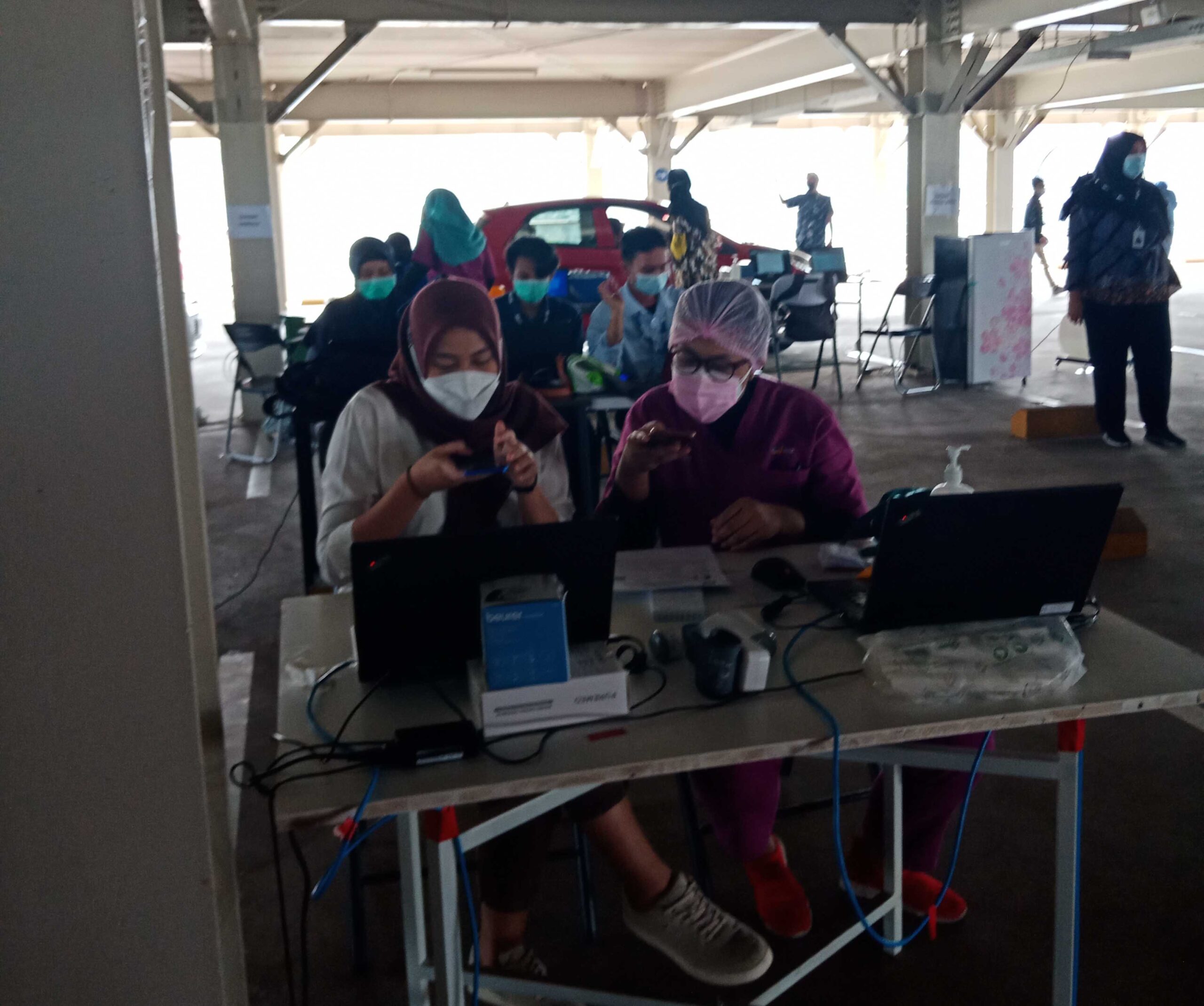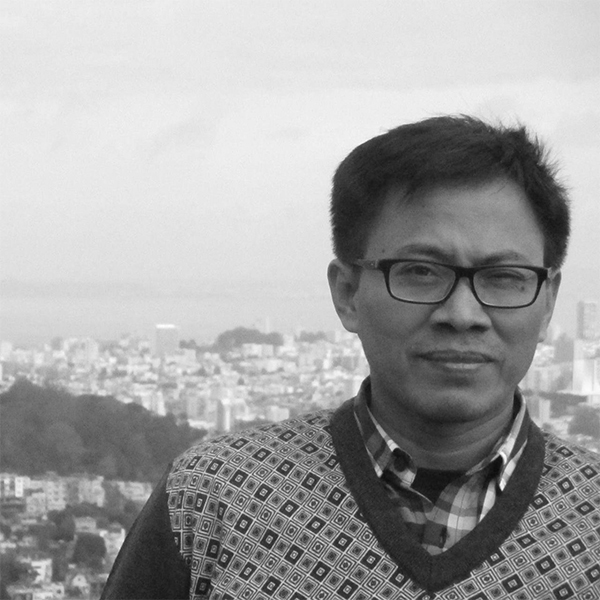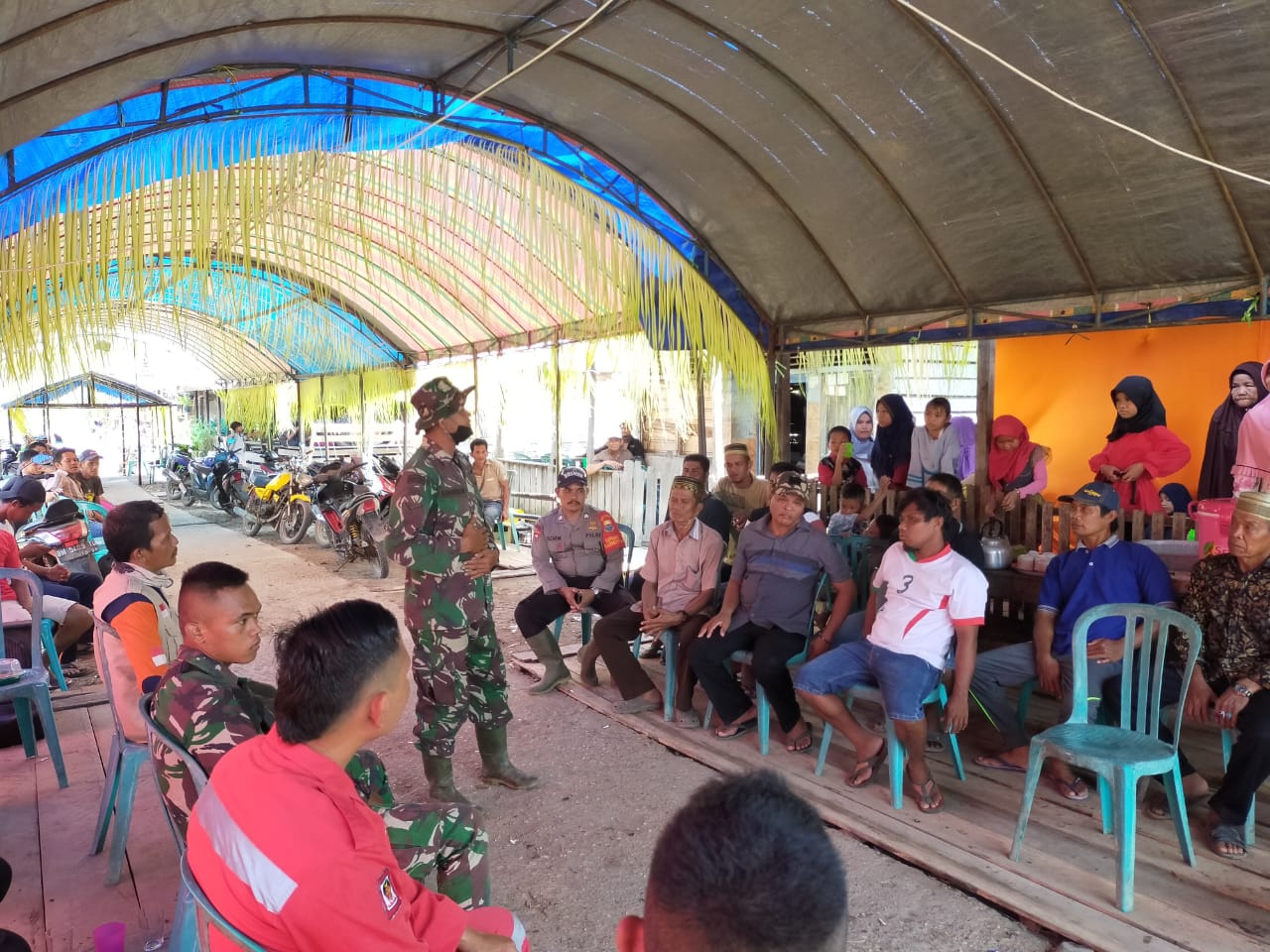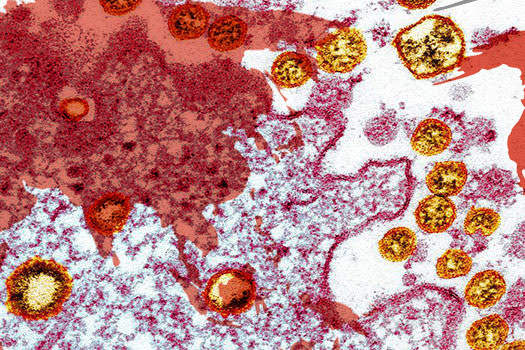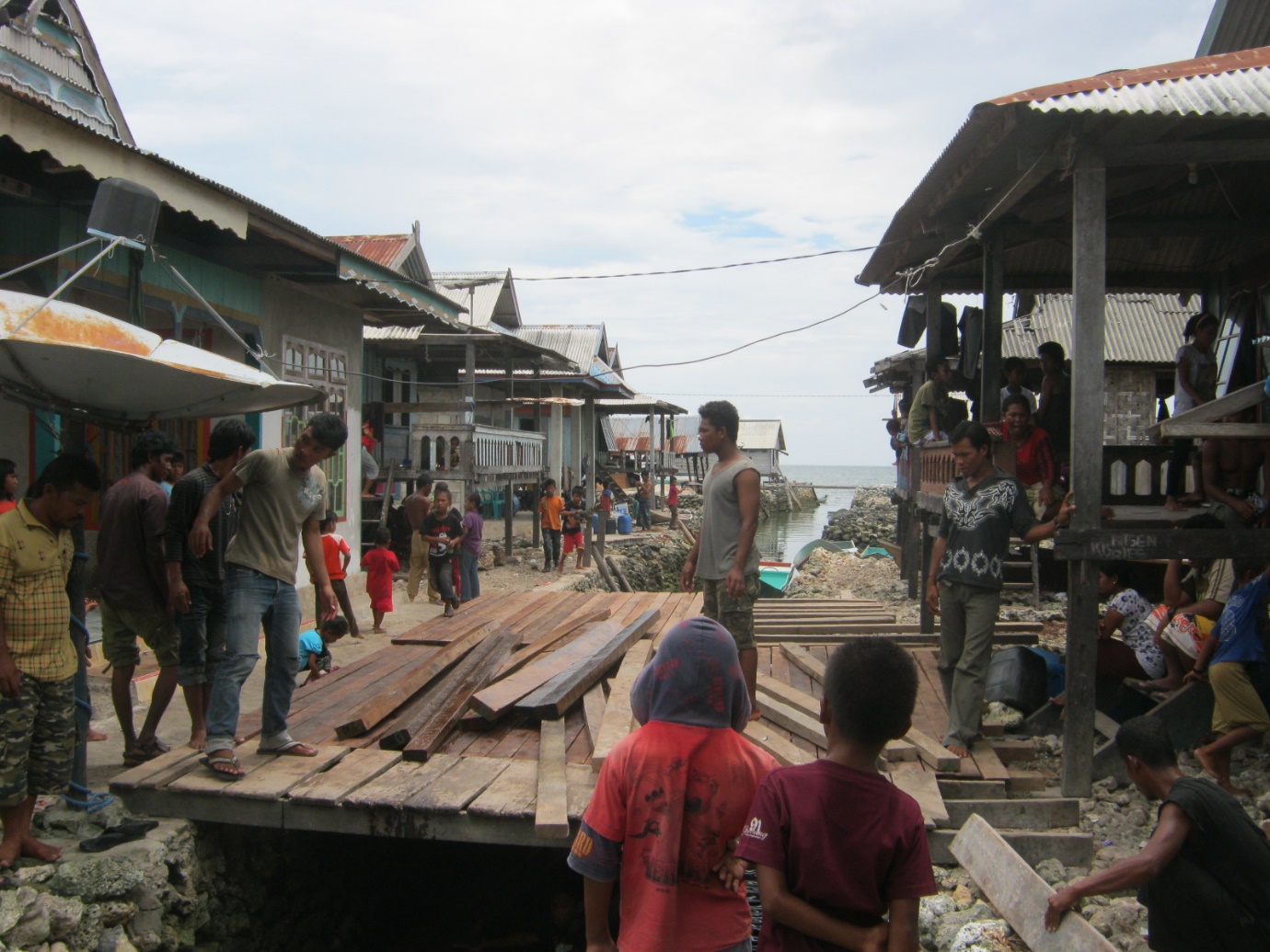Profits over People
The provincial government of Papua was one of the few regions in Indonesia that took swift action to impose ‘local restrictions’ during the initial stage of the pandemic outbreak. Authorities decided to restrict people’s mobility from and to the region by closing off all transportation routes (with the exemption of freight traffic for some essential business) and enforced social distancing measures as of March 26, 2020 until June 4, 2020. However, the Government has decided to implement a relaxation policy, which starts from 5 June to date. This policy means easing social restrictions, opening flights with limited quota, and implementing strict procedures to all the passengers who wish to exit and entry Papua.
While other regions hesitated to enforce similar measures, the Government of Papua realized the specific challenges in containing the surge of COVID-19 cases early on, such as an inadequate health service, a shortage of medical workers, and poor road access, among others. According to the spokesperson for the Papua COVID-19 response team, Silwanus Sumule, the province has only seven pulmonologists, 60 ventilators, and 200 non-WHO standardized isolation rooms. In addition, as a province with the lowest Health Development Index score in the country, it is understandable that the provincial government did not want to endanger its citizens by continuing to allow the free mobility of people from and to Papua.
Despite these decisive steps from the local government, Papua still ranked in the top 10 Indonesian provinces with most COVID-19 cases, with 2027 positive cases as of early July 2020. The number has risen sharply over the last 3 months, starting from mid-March 2020 where only seven cases were found. One of the regencies in the province with the highest record of COVID-19 outbreak is Mimika, where its cases predominantly come from Tembagapura district, an operational area of PT Freeport Indonesia, the world’s largest gold and copper mining corporation. On May 26, 124 workers of the corporation were reported to have been confirmed positive for the coronavirus. The regent of Mimika submitted a plea to President Joko Widodo to temporarily shut down mining activities in order to curb the spread of the disease. Yet to date, the Government has not yet responded to the plea.
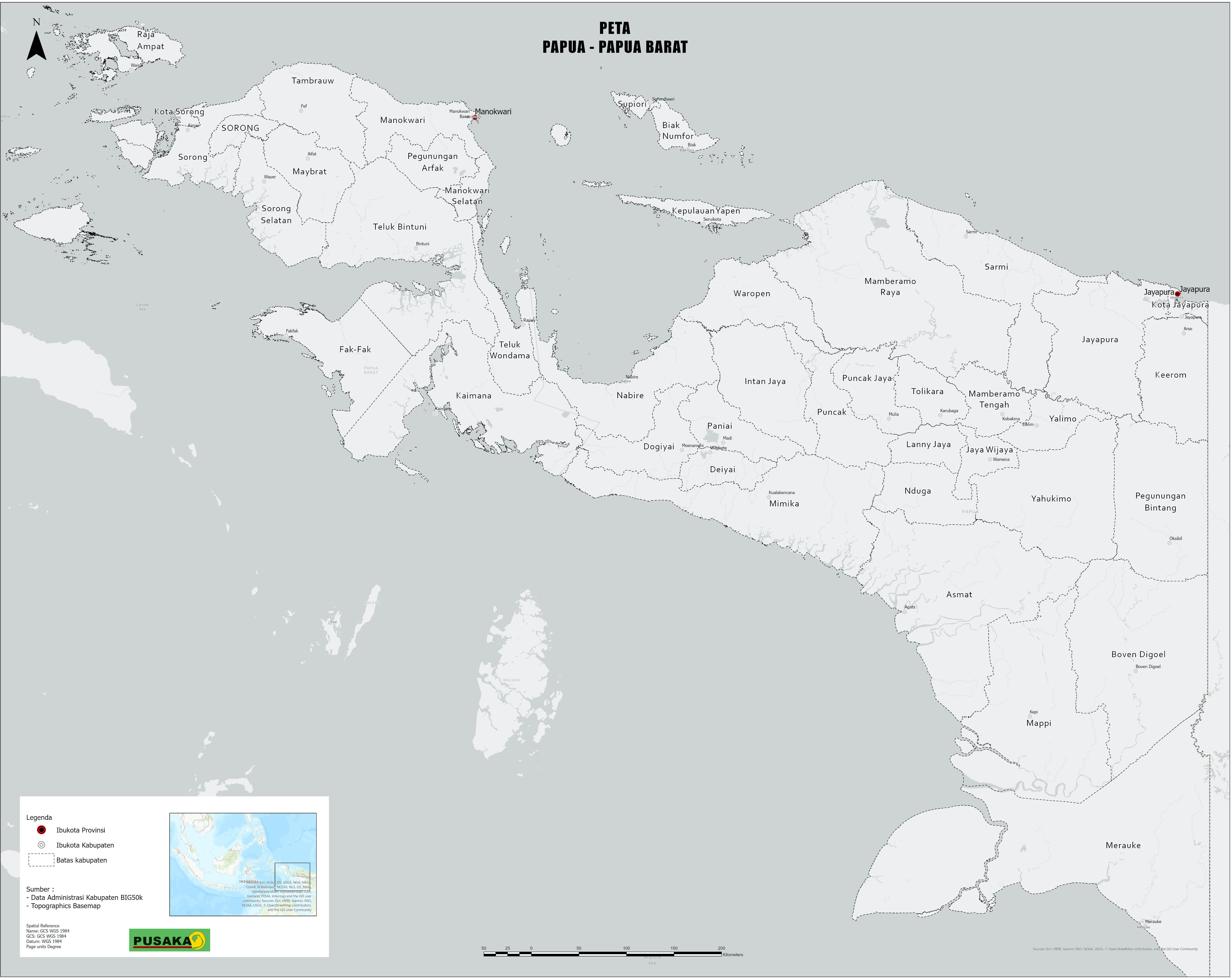
Source: Yayasan Pusaka organizational documentation
Jokowi has preferred to enforce a softer version of lockdown, the large-scale social restrictions (Pembatasan Sosial Berskala Besar PSBB) rather than the nationwide, “hard” lockdown or territorial quarantine to mitigate the rapid spread of COVID-19. He argued in several interviews that lockdown would not be suitable for Indonesian society and believed that preventing crowds and limiting people’s mobility would be enough to contain the spread of virus. However, Professor Wiku Adisasmito the chief of the national COVID-19 task force expert team, explained that the main reason for the Government’s decision to choose PSBB over lockdown was due to the unbearable economic, social and security consequences for Indonesia.
It has been obvious that Jokowi’s primary priority rests on economic stability over the people. Instead of discussing how to prepare outbreak mitigation by improving health services and infrastructure, in mid-February, when no positive cases had been reported, Jokowi preferred to issue four instructions to lessen the economic impacts of virus spread centred around the fiscal and monetary sectors. Even after the number of cases sharply surged, his administration has prioritized the economy by refusing to implement lockdown and instead relaxed PSBB arrangements and urged a return to the ‘new normal.’
The national government has also tended to prioritize the economy over people’s welfare in Papua. This has been clear from the criticism towards Lukas Enembe, the current governor of Papua, and his restriction proposals for Province put forward by Tito Karnavian, the Minister of Home Affairs. Karnavian insisted that there was no-urgent need to employ a local lockdown, while Enembe was concerned with the lack of adequate health services to contain the potential COVID-19 massive outbreak in Papua. Moreover, the Jokowi presidency never responded to a plea to temporarily shut down the operation of PT Freeport Indonesia.
Though the Papuan Provincial government still enforces local restrictions, Jakarta’s anxiety is understandable. Enforcing total lockdown in Papua might disrupt the ongoing capital circuit over natural resources exploitation and extractives industries. PT. Freeport Indonesia (FI) might be perfect example of an extractive project, due to its contribution to economic growth in Indonesia, it may still operate during the pandemic. Freeport was the first foreign company to sign a contract in the beginning of Soeharto’s authoritarian period to date (1967-2021) marked with Kontrak Karya I (Contract of Work – CoW I ), after the enactment of Number 1 of 1967 on foreign investment (UU PMA). A work contract was a mining concession agreement between the Indonesian Government with Freeport over two phases; the first phase of CoW 1967-1997), Freeport-MacMoran was granted a concession of 10.000 acres over thirty years, and in 1997 it received an extension until 2021 within a concession area that increased to 2.6 million hectares (including the customary land of the Amungme and Komoro two indigenous groups). Under Jokowi’s administration, some new deals were achieved between Indonesia and Freeport. Firstly, changing the status of CoW into a special mining permit (IUPK) that would provide investment certainty over 20-year operation licenses until 2041, and secondly in return, the Indonesian Government will receive a 51 percent share ownership by shelling out Rp 60 trillion (approximately US$ 3.85 billion dollars).
Since the first mining operation in 1973, Freeport has been carrying out extraction operations for almost half a century, and during this period, they have been allegedly responsible for a number of issues including ecological damage, displacement and the marginalization of indigenous peoples from their customary lands as well as human rights abuses, to name but a few. In fact, the 51 percent ownership stake is considered not comparable with the adverse impacts generated by Freeport during its extraction regime in Papua. When it comes to energy and mineral mining policies, all administrations, from Soeharto to Jokowi have one thing in common: the desire to not impede the flow of the capital circuit. Hence, even when an extraordinary situation as dangerous as the current global COVID-19 pandemic emerges, Freeport’s daily production in Mimika Regency remains unchanged. Yet the pandemic has proven to be dangerous, as it has infected many Freeport workers. Undeterred, the corporation continues to operate as if nothing has happened. It is obvious that the request from the Mimika Regent to the national Government to temporarily shut down Freeport’s operation is not, and perhaps will never be, granted.
Additionally, in dealing with the central government’s ambiguity in regulating natural resources based companies in Papua, a potential site for a massive COVID-19 outbreak – indigenous and poor communities are now facing another challenge. The restriction of their daily activities has become a major problem for them; those indigenous people who resides in the central regency and in rural areas.
Livelihood Challenges for the Indigenous People
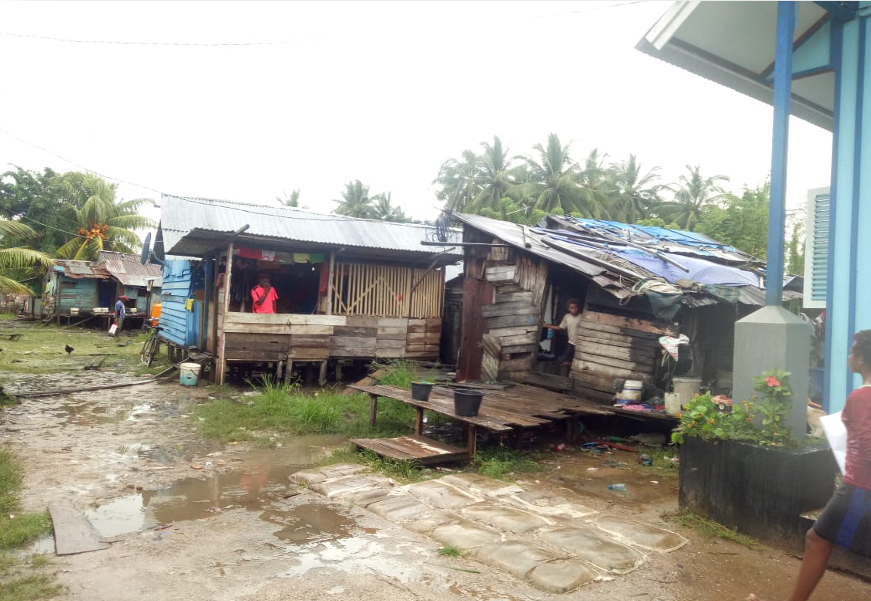
Kampung Asmat in Center of Regency of Merauke. Source: Author
Merauke, a regency in Papua, shows how the pandemic has intensified the vulnerability of indigenous Papuans. At the centre of the regency, we can find slum communities scattered across several sites. They share similar recognizable characteristics. They live in a non-permanent/emergency inhabitable shelters with more than 3 households per shelter and support their livelihood by working in the informal sector as daily-freelance freight workers in the airport and seaport or as scavengers and fisherfolks among other occupations.
The people, who constitute the majority of poor residents in Merauke, come mostly from rural areas. In the past, they relied on hunting, gathering, farming, fishing, and other rural economic activities. However, they have increasingly decided to migrate from their hometowns to the urban centre of the regency. According to Beatrix Gebze, a community organizer at elADPPER, an organization advocating women’s rights in South Papua, there are two main reasons behind this migration phenomena, Firstly is the lure of modernization; plenty of job opportunities, adequate public facilities, access to government programs, and the like. Secondly, the proliferation plan of South Papua Province (Provinsi Papua Selatan) has encouraged a wave of people’s mobility to the centre of capital.
The fall of President Soeharto marked the end of the authoritarian regime and moved Indonesia into an era of reform. One of the demand of people’s movement at the time was to implement regional autonomy that aimed to narrow the disparity between peripheral and central areas. Through the enactment and enforcement of Law number 22/1999 concerning regional government, Otonomi Daerah/OTDA (Regional Autonomy) commenced. One of the effects of decentralization was regency proliferation (Pemekaran Wilayah) in underdeveloped regions. Proliferation has been expected to mitigate disparity problems in such regions by allowing self-governance over resources, be they natural or the people and culture. Before the law was enacted, there were 27 provinces, 249 districts and 65 cities throughout Indonesia, and 21 years on the number has increased dramatically to 34 provinces, 416 districts with 98 cities within which there are 7,024 districts at a sub-district level and 81,626 village-level regions. Furthermore, Papua’s status as a special autonomous region (OTSUS), since the enactment of Law number 21/2001, also encouraged the agenda of proliferation. OTSUS, which came along with the special autonomy funds, supplied a local government to fund the agenda.
South Papua has also been a target of regional proliferation. In the first 100 days of the Jokowi’s second presidency he showed enormous enthusiasm for the South Papua proliferation plan on the pretext of strengthening national security and equitable development. But such rhetoric should be best considered as an elite project rather than a genuine demand from local people. Instead of distributing wealth, studies have shown that proliferation in underdeveloped regions does not solve their “underdevelopment” but instead centralizes poverty into autonomous regions (Faoziyah and Salim, 2015).
Indigenous peoples who are trapped in Merauke Regency due to the lure of modernization and proliferation agenda also face this situation. They leave their hometowns and customary lands collectively wishing to improve their lives. However, what they imagine soon hits an impasse, for the migrants instead get trapped in a cycle of poverty and dependence on precarious, informal work. Mobility restrictions from and to Papua have closed down airport and port activities. This affects their daily income as freight workers who are dependent on passengers coming in and out. This problem is exacerbated by the fact that they also face administrative problems. They are considered illegal migrants and therefore are not recognized as the district’s legal residents by the local government. This means they will not be prioritized to receive social relief and aid during this pandemic.
Meanwhile, rural-based Indigenous Papuans face a slightly different situation compared to those who today reside in the centre of regency during the COVID-19 crisis. These indigenous people are dependent on the sustainability of their environment, and primarily rely on hunting, gathering, fishing and processing sago for subsistence needs. Unlike the precarious poor urban dwellers, these people are not experiencing the fear of a food shortage during the COVID-19 pandemic. Collectively, they can return to their customary lands, build bivak orwooden-temporary houses, and begin to harvest and process Sago, and plant food crops to stock up their food barns.
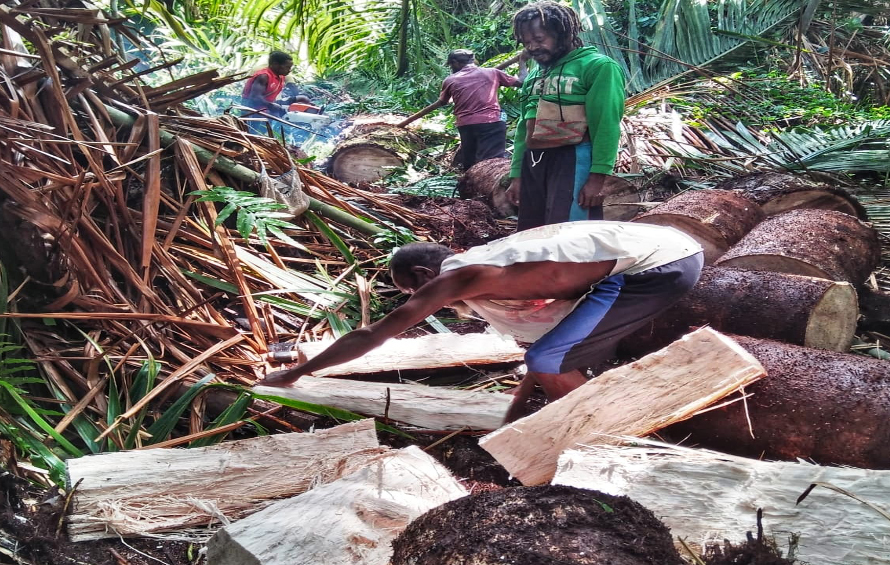
Indigenous people of Wambon Tekamerop in Kali Kao Village, Boven Digoel, Papua process Sago (Pangkur) during the pandemic. Source: Pusaka organizational documentation.
Sago plant (Metroxylon sp.) is a staple food for a majority of indigenous people in Papua. It is good source of starch, and considered a productive and efficient plant, when compared to other carbohydrate-producing crops (Bintoro et all, 2018). It grows both naturally in swamps and on peatlands. Furthermore, it is not only a source of livelihood, but possesses sacred value within indigenous peoples’ cosmology. For example, for Marind Anim tribes, it shares a similar ancestral spirit or dema (Chao, 2019).
According to Agustianus Meanggi, an indigenous Awyu elder in Kampung Anggai in Boven Digoel Regency, most indigenous people have ‘abandoned’ and ‘forget’ sago as their primary traditional food. ‘We abandoned our tete nene (ancestors) to preserve and consume sago. We left our root as an indigenous people.’He argued that rice slowly replaced sago as a staple food in his village since the mid-60s, in the initial period of a transmigration program promoted by the government. This program was a part of what Dale Gietzelt (1989) referred as a process of ‘Indonesianization’: the introduction of an Indonesian world-view through contact with the ‘civilized,’ as represented by Javanese, aiming to strengthen Indonesia’s statist nationalism among Papuans. This ‘assimilation’ eventually caused several changes within Papuan’s lives such as the forced substitution of sago for rice as a staple food by forcing local people to plant it (Singh, 2008).
Agustianus finishes in high intonation by saying ‘But nowadays, not only rice sets aside sago, Sawit (palm oil) also destroys our sago hamlet.’ He belongs to few clans in his village who have rejected to cede their customary land to palm oil plantations. His settlement was affected by a large-scale oil palm plantation expansion under the Tanah Merah Project that plans to convert more than 280.000 hectares of forests and swamp into privatised concessions. He is concerned about the conditions of the indigenous people and he believes they are slowly committing suicide by sacrificing their indigenous identity through selling their land to corporations. In confusion he asked, ‘Why people keep selling their Mother for the sake of money?’
‘Your Land is The Mother,’is the philosophical belief of the indigenous people in Papua. They treat forest or land as one’s sacred mother, in maintaining indigenous human civilization; as a food and water source, the largest natural pharmaceutical epicentre of their cosmology and other customary values, and as signifier of their clan/tribes’ territory. However, sacred values over customary land is giving way as it experiences the commodification of values into commercial objects which can be transferred at any time based on money lobbies and other pragmatic agreements.
‘Back to Sago’, for indigenous people in rural areas in Papua today is a rational alternative option amid the COVID-19 pandemic that has hit the national economy at large. Nonetheless, not all indigenous peoples in Papua currently have a similar chance to go ‘Back to Sago.’ Some of them have experienced great losses over their customary land rights due to land annexation by palm oil plantations. They cede their land in the expectation of ‘easy’ money and prosperity. Often, they sign contracts without any proper and prior information about the legal terms of the agreement. Some of my research findings show that palm oil corporations deliberately avoid explaining this in order to smooth their investment and to escape any potential future conflicts. Indigenous people believe that their customary land will be returned to them one day, yet they are never told that it automatically belong to the state after the agreement expires. As such, they end up as landless indigenous people. This will also make them vulnerable to the problem of food shortage, especially during the time of this pandemic.
Conclusion
In a strange twist of events, the State Logistics Agency (Bulog), a government agency responsible for securing staple food supplies, has now started to increase the stock of sago anticipating food shortages. Bulog’s decision and statement have sparked public debates on social media. People have criticized the hypocrisy of government policies that often ‘subordinate’ this easternmost staple through large-scale land conversion for the expansion of land-based investments; palm plantations, industrial forest plantations, and other national economic projects. In fact, Papua has indeed become one of the sites for the expansion of capitalism manifested in extractive development projects and other pro-elite policies. This expansion marginalizes its population from the processes of economic development, by making their livelihoods more vulnerable, poor and full of uncertainty. The COVID-19 pandemic also exacerbates and brings challenges to their lives. This pandemic has been the window that opened up our government’s eyes to the reality that we can’t ‘eat’ palm oil, copper or coal. Instead we will need more food and greater sustainable livelihood to anticipate upcoming future ‘threats.’
9 July, 2020
(The author expresses her thanks to Beatrix Gebze (elADDPPer), Agustinus Meanggi and Family, Franky Samperente (Pusaka’s Executive Director), and Iqra Anugrah for their meaningful advice and discussion.)
References
- Aziz, Abdul. 2020. Jokowi soal Dampak Corona Fokus Ekonomi, Mitigasi Kesehatan Kapan? 29 February. (Jokowi, on the impact of the Corona’s economic focus. Health mitigation when?) https://tirto.id/jokowi-soal-dampak-corona-fokus-ekonomi-mitigasi-kesehatan-kapan-eB1F. (Accessed 21 May, 2020)
- Bernie, Mohammed. 2020. Betapa Tidak Siap Papua Hadapi Corona COVID-19. 27 March. (Papua is Not Ready to Contain Corona COVID-19). https://tirto.id/betapa-tidak-siap-papua-hadapi-corona-COVID-19-eH2S. (Accessed 21 June, 2020)
- Bintoro M.H., Iqbal Nurulhaq M., Pratama A.J., Ahmad F., Ayulia L. 2018 Growing Area of Sago Palm and Its Environment. In: Ehara H., Toyoda Y., Johnson D. (eds) Sago Palm. Springer, Singapore. doi.org/10.1007/978-981-10-5269-9_2 Chao, Sophie. 2019. Sago: A Storied Species of West Papua. 23 May. https://www.extinctionstories.org/2019/05/23/sago-a-storied-species-of-west-papua/. (Accessed 21 June, 2020).
- Dewan Perwakilan Rakyat Republik Indonesia. n.d. Undang-Undang Republik Indonesia Nomor 22 Tahun 1999 Tentang Pemerintahan Daerah (Law No. 22/1999 on Regional Governance). http://www.dpr.go.id/dokjdih/document/uu/UU_1999_22.pdf (Accessed 7 July, 2020).
- Faoziyah, U., & Salim, W. A. 2016. Proliferation Pattern in Underdeveloped Region: Is it the Real Solution to Solve Underdeveloped Region’s Problem in Decentralized Indonesia? Procedia – Social and Behavioral Sciences. 227:824–832. doi:10.1016/j.sbspro.2016.06.151 Gietzelt, D. (1989). The Indonesianization of West Papua. Oceania, 59(3), 201–221. doi:10.1002/j.1834-4461.1989.tb02322.x. P Singgih, Viriya. 2017. Alleged rights violations weigh on Freeport’s shoulders. 08 March. https://www.thejakartapost.com/news/2017/03/08/alleged-rights-violations-weigh-on-freeports-shoulders.html. (Accessed 21 June, 2020)
- Ramadhan, Aditya. 2019. Indeks pembangunan kesehatan: Bali tertinggi Papua terendah. 15 July. ( Health development index: Bali is highest, yet Papua is the lowest). https://www.antaranews.com/berita/956716/indeks-pembangunan-kesehatan-bali-tertinggi-papua-terendah. (Accessed 21 June, 2020)
- RefWorld. 2001. Indonesia: Law No. 21 of 2001, On Special Autonomy for the Papua Province. https://www.refworld.org/docid/46af542e2.html (Accessed 7 July, 2020)
- Singh, Bilveer. 2001. Papua ; Geopolitics and The Quest for Nationhood. New York; Routledge. Tarigan, Antonius. 2018. Konsep Pemekaran Wilayah Indonesia Era Reformasi (Indonesia’s Concept of Regional Proliferation in the Reform Era). 27 November. https://www.literasipublik.com/konsep-pemekaran-wilayah-indonesia-era-reformasi (Accessed 7 July, 2020)
- The Gecko Project. 2018. The secret deal to destroy paradise: The story behind the single biggest threat to the rainforests of Indonesia. 29 November. https://thegeckoproject.org/the-secret-deal-to-destroy-paradise-715b1ffc0a65. (Accessed 21 June, 2020)
- The Jakarta Post. 2018. Freeport has cost $13 billion losses in environmental damage, says BPK. 20 March. https://www.thejakartapost.com/news/2018/03/20/freeport-has-cost-13-billion-losses-in-environmental-damage-says-bpk.html. (Accessed 21 June, 2020)
- The Jakarta Post. 2014. Komnas HAM finds human rights violations in Freeport tunnel cave in. 14 February. https://www.thejakartapost.com/news/2014/02/14/komnas-ham-finds-human-rights-violations-freeport-tunnel-cave.html. (Accessed 21 June, 2020)
- Yahya, Ahmad Nasruddin. 2020. 100 Hari Jokowi-Maruf: Bidik Pemekaran Papua. 02 February. (100 Days of Jokowi-Maruf: Aim for the Provincial Proliferation of Papua). https://nasional.kompas.com/read/2020/02/02/11320731/100-hari-jokowi-maruf-bidik-pemekaran-papua?page=all. (Accessed 21 June, 2020)
Rassela Malinda is a researcher at Yayasan Pusaka Bentala Rakyat, an Indonesian civil society organization working on environmental justice and indigenous people’s rights, and currently based in Merauke, Papua.
Pusaka Website : (https://pusaka.or.id/en/pusaka-or-id-english/)
Citation
Rassela Malinda. 2020. “Capitalist Expansion, COVID-19, and the Misery of Papuans” CSEAS NEWSLETTER, 78: TBC.


